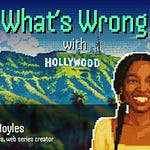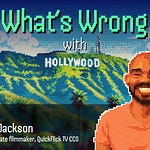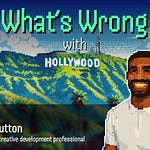🥳Our First Podcast is Live!🥳
So excited that episode 1 of our podcast is out! Check it out above - and once we’ve set up our RSS feeds properly, on Spotify, Apple Podcasts, Overcast and YouTube Podcasts.
In this inaugural episode of What's Wrong with Hollywood, I sit down with filmmaker
, an award-winning writer-director, NYU Tisch professor, and writer of the Substack newsletter Underexposed.PS: I really hate my voice and questions and shitty attitude so next time I’ll probably just have a robot do the whole interview.
In our full conversation, we cover:
🎭 Why "humanize don't moralize" - How being preachy and didactic in storytelling alienates audiences who are already allergic to message-driven content
🌱 The biodiversity crisis in Hollywood - Why bringing back small and mid-tier budget movies is essential for a healthy entertainment ecosystem instead of the current monocrop model
💌 The art of indie outreach - Specific tactics for reaching talent and financiers, from providing comps and case studies to writing heartfelt letters that explain the "why" behind your project
🚢 Why traditional Hollywood feels like boarding a sinking ship - How the wrong people now control studios, running them like tech companies while shutting out original voices who aren't nepo-babies
📱 The Luke Barnett breakthrough model - How a filmmaker got rejected from every major festival, released his short online, gained millions of views, and now gets to make his movie
🎬 Building your own studio from scratch - Establishing a strong house style and brand identity, exploring hybrid crowdfunding models like Eli Roth's approach, and ditching antiquated marketing techniques
The full transcript can be found in the show notes.
The below transcript has been edited using AI for length and clarity.
JON
First things first, gotta start with the question at the top. What is wrong with Hollywood?
ALEX
I always reach for analogies and I think Hollywood used to be like a vineyard, where the focus was on cultivating quality over time. And I think what's happened in recent decades is that it's become more like an industrial monocrop farming situation where we're optimizing for yield but not necessarily taste.
Over time due to various factors such as deregulation and corporate consolidation, these larger conglomerates have come to take ownership over studios. And with that, I think the guiding principles of Hollywood have shifted away from quality storytelling and toward more quarter by quarter profit.
Another thing that's happened is that the people that run the studios have changed over from people that appreciate the art of making films along with the art of commerce to strictly people that think in terms of business and people that want to protect their jobs in the short term.
JON
Have you thought about ways to return to that more organic model?
ALEX
Let me extend the analogy to the idea of biodiversity. You've got a situation where you have an ecosystem of movie makers, large and small, and what has happened is it's just become dominated by one large species.
All of these medium sized players that we might have grown up loving the movies that they made in the mid-market, mid-tier range have all been absorbed or collapsed in the face of these larger beings.
What needs to happen is that we need to encourage more biodiversity to come back and make the place more vibrant and diverse in terms of smaller budget movies and mid-tier movies.
JON
You teach at NYU Tisch and you have students who have not yet been exposed to the industry. What about the experience of teaching these students has made you hopeful about the future of filmmaking?
ALEX
One of the weirdest, strangest surprises of my life is how fulfilling and mutually beneficial teaching has been. I came into the situation with all of the kind of negative, cynical prejudices that you would expect of an elder millennial stepping into a nest of Zoomers. And I couldn't be more wrong.
Who is surviving more adversity than the current generation of Zoomers? Look at what they're up against. It's incredible. It's unprecedented. There were times when I was trying to make movies with these guys at the height of the pandemic, and we weren't even allowed to roll camera without masks on. Yet there's these students, not once did they really complain, they all just kind of rolled with it.
The thing that we're not really thinking about with them is how adaptable they really are.
JON
Now you and I have different views on the word content. Tell me why you think the word doesn't serve us well.
ALEX
I think the word has its purpose for the stuff that we encounter online—it's more marketing, sharing ideas, wisdom, thoughts.
Where we run into trouble is when we start to apply the word to everything. If we apply the word content to fine arts and filmmaking, it's just a different animal. Content is really about self-promotion and dissemination of information.
I think about the way that in the world of healthcare doctors have started to be called providers. There's a nefarious incentive underneath that—the people in the financial, capital markets trying to devalue the worth of a doctor by calling them a provider as a tool to drive down their value in the marketplace. And I'm worried about content applied to film and television work for that reason.
JON
When we spoke last, you mentioned the idea of perfectionism getting in the way of actually doing the work. What tips do you have to move forward without letting perfectionism get in the way?
ALEX
I think the best thing you can do is try to impose on yourself a schedule that emphasizes process over result. The victories that you get from results are fleeting and few and kind of hollow when compared to the joy that you experience when you get together with a bunch of friends or collaborators and make something. If you can realize that, you need to be making things now.
You shouldn't just be sitting around planning or waiting for permission. A lot of us spend a lot of our days on these devices, these smartphones, complaining about the death of our industry when you could just flip it over and notice that there are lenses on the back of this that are capable of shooting 4K video.
How crazy is that?
JON
How do you think about getting something made if you're not already an established filmmaker with the backing of a major studio?
ALEX
You already have a no from everybody that you're not reaching out to. So you might as well just swallow your pride and try to reach out to people.
Artists and imaginative people assume that everybody has the same powers of imagination that they do. When you're talking to the people with money, you have to meet them where they are.
You need to strengthen your message and speak their language. That means embracing the ideas of providing comps, doing the research to provide case studies of projects that are similar to yours that have done well, and perhaps reaching out to line producers to make budgets for your films. That communicates that you're serious and that you understand that this is a business.
JON
How do you think about the distribution of creative talent? What gaps or inefficiencies do you see in the marketplace between creatives and buyers?
ALEX
We're in a situation where the wrong people, in my opinion, have come into control and they're trying to run the business like a tech company.
People that are financing film and TV are thinking like accountants and looking at data that streamers accumulate and thinking, "This worked in the past. This is a safe bet. So more of that." I think it's shut out a lot of original voices. The good news is that the way that things are right now is untenable.
You can situate yourself best by producing what you can with what you've got now to demonstrate to those people that you're there, you're ready, your vision is clear and you can execute.
There's a filmmaker named Luke Barnett who made an 11 minute short film called The Crossover Express that got rejected from every single major festival. He released it online, it got millions of views. And now he gets to make the movie.
Meanwhile, people that are lucky enough to get their film in these legacy film festivals aren't really moving forward. They've successfully boarded what I see as a sinking ship. You're seeing it right now with investment in what's called new media and the creator economy.
A lot of us in the film business are having trouble raising money for our films, but if we were to move like two inches to the left, all of a sudden there's this fire hose of investment happening.
Whoever's sitting at the center of that Venn diagram—if you try to sit there, I think that's where success is gonna come in the future.
Thanks for reading, and be sure to watch the whole thing at the top of this post!
Stay tuned,
Jon
Things I’m Reading Right Now
and at discuss endless endings in feature films, citing Lord of the Rings, The Studio and Sunshine (be still my heart): at opens his post with the phrase “Raw dogging” and I’m instantly hooked. Also the rest of it is pretty good too: at writes about jobs that maybe probably don’t need to exist… And I’m here for it!You made it! Til next time!












